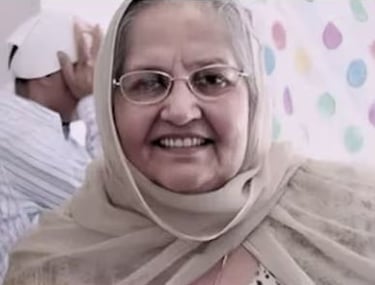No Bed, No Shower”: Lawyer Reveals 73-Year-Old Harjit Kaur’s Harrowing ICE Detention Experience Before Deportation
A 73-year-old Indian woman, Harjit Kaur, faced harsh conditions in a U.S. Immigration and Customs Enforcement (ICE) detention center before her deportation. Her lawyer has revealed disturbing details—no bed, no shower, and no proper care during her confinement. The case sheds light on the struggles of elderly immigrants caught in the web of U.S. immigration enforcement and raises questions about human rights and dignity in detention.


By: Bharat Daily Samachar Date: 26 Sep,2025
Introduction
The plight of immigrants in U.S. detention facilities has once again come under the spotlight after shocking revelations about the treatment of Harjit Kaur, a 73-year-old Indian woman, who was recently deported. Her lawyer has described her time in detention as a nightmare, claiming she was denied basic human needs like a bed, shower, and adequate medical care.
This story has sparked outrage among immigrant rights advocates, who argue that elderly and vulnerable detainees are often the silent victims of a broken immigration system.
Who is Harjit Kaur?
Harjit Kaur, a grandmother and long-time resident within the Indian diaspora in North America, had been living in the United States before her deportation case began. While her full immigration history has not been made public, reports suggest that she was facing removal proceedings after her visa or residency status was challenged.
For many elderly immigrants like her, deportation is not just a legal setback but also a humanitarian crisis, as they are separated from family, denied dignity, and left to endure punishing detention conditions.
The Ordeal in ICE Detention
According to her lawyer, Harjit Kaur’s detention conditions were inhumane and deeply troubling:
No Bed: She was reportedly forced to spend nights without a proper bed, highlighting poor living conditions in ICE facilities.
No Shower: For days, she was denied access to basic hygiene facilities, raising serious health concerns.
Lack of Medical Support: At 73, her health and age required special care, but the lawyer claims she was not given proper attention.
Emotional Trauma: Being detained in a foreign land away from her family left her mentally distressed.
Her story echoes the experiences of many detainees who report overcrowding, lack of basic necessities, and neglect in U.S. immigration facilities.
Why This Case Stands Out
While stories of tough detention conditions are not new, Harjit Kaur’s case is particularly significant because of her age and vulnerability. Advocates argue that elderly immigrants should not be subjected to such harsh treatment, especially when their health is at risk.
The case highlights several important issues:
Human Rights in Detention: Are ICE facilities meeting basic humanitarian standards?
Elderly Care: Should there be special protocols for detainees above a certain age?
Immigration Policy Reform: How can the U.S. balance immigration control with compassion?
The Larger Debate on U.S. Immigration
Harjit Kaur’s ordeal feeds into the larger debate on U.S. immigration enforcement, where questions of detention conditions, family separation, and deportation practices are constantly raised.
For Advocates: This case is proof that ICE detention needs urgent reform to protect human dignity.
For Critics of Immigration: They argue that rules must apply equally to everyone, regardless of age.
For Policy Makers: It’s a reminder that immigration is not just about border control but also about human lives.
In recent years, reports by watchdog groups and NGOs have consistently criticized ICE detention centers for overcrowding, inadequate medical care, and poor living conditions.
The Human Side of Deportation
Beyond politics and policies, Harjit Kaur’s story is a reminder of the emotional toll deportation takes on families. For a 73-year-old, being locked in a detention cell with no comfort or dignity is not just a legal punishment—it is a human tragedy.
Many families in the Indian diaspora are shaken by this case, fearing that their elderly relatives could face similar ordeals if caught in immigration disputes.
India’s Perspective
India has one of the largest diasporas in the world, and cases like Harjit Kaur’s often draw attention back home. Families in India see such incidents as an indictment of how foreign governments treat immigrants, especially the elderly. Diplomatic efforts between New Delhi and Washington may come under pressure to address basic human rights concerns in detention cases involving Indian nationals.
What Happens Next?
While Harjit Kaur has been deported, her case may trigger:
Legal scrutiny of ICE detention policies for vulnerable groups.
Calls from rights groups for better treatment of detainees.
Diplomatic discussions between India and the U.S. on protecting the dignity of Indian immigrants.
Her lawyer’s testimony could also add momentum to ongoing lawsuits and petitions challenging detention practices in the United States.
Conclusion
The story of Harjit Kaur, the 73-year-old Indian grandmother deported after enduring inhumane ICE detention conditions, shines a harsh light on the cracks in the U.S. immigration system. Denied a bed, a shower, and even basic dignity, her ordeal has raised serious human rights questions.
As immigration debates rage in America and across the world, one thing remains clear: no human being, especially the elderly, should have to suffer in detention without dignity and care. Harjit Kaur’s story is not just about deportation—it is about humanity, compassion, and the urgent need for reform.
